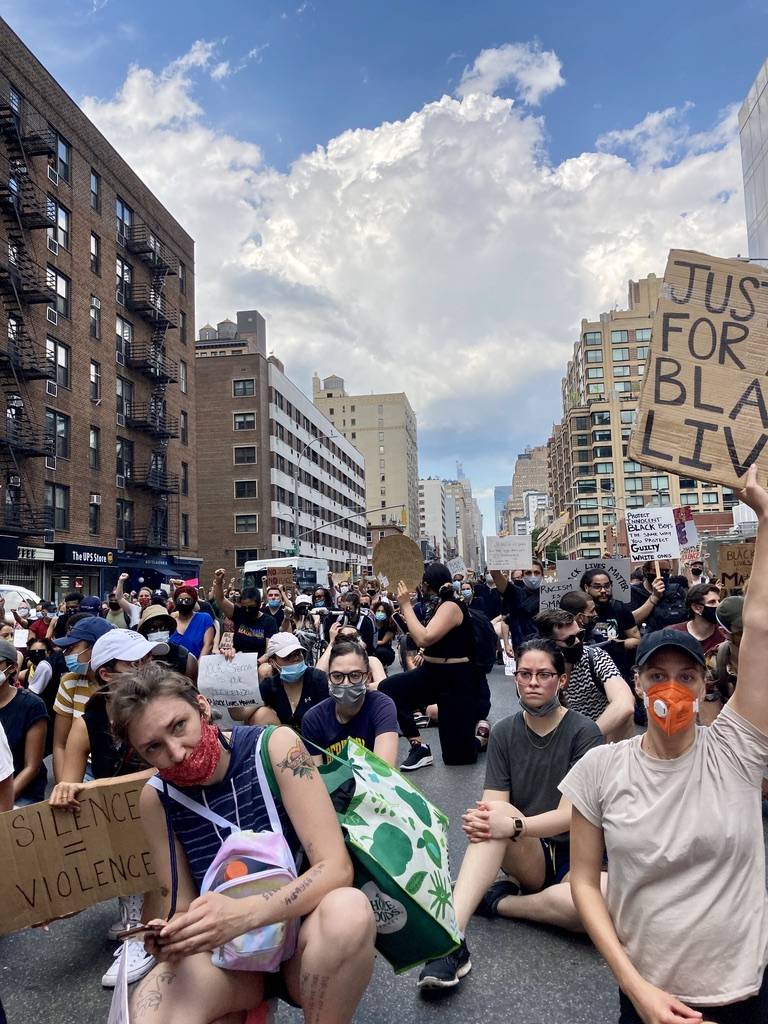These past few weeks I’ve been struggling more than ever before. Two months ago I struggled to make sense of the level of death and illness surrounding me in the midst of the COVID19 pandemic. This struggle is different. It’s been low and slow for decades. It has reached a tipping point. I’m now realizing how much anger and resentment I’ve tucked away for years in an effort to move forward. Except the forward part is an illusion. Or perhaps it’s just the selfish reality of my life because, unlike too many others, I have had the luxury of forward.
Yesterday, I attended a protest that began on 34th street and 5th avenue and circled around the neighborhood a few times before ending in Washington Square Park. It was a remarkable display of support and solidarity for the Black Lives Matter movement in light of the recent murder of George Floyd, Breonna Taylor and the countless other black lives taken at the hands of police violence. In several chilling moments, the protesters put their hands up and chanted “Hand up, don’t shoot!” as we marched by NYPD. I cried a few times wondering how we got here. As I looked around me, there were people of all backgrounds – black, white, Asian, Indian, LatinX, gay, trans, etc. – holding signs and chanting in unison for a common cause. And as I marched alongside them, I couldn’t help but wonder how many of my fellow protesters would go home, post pictures and videos of their great efforts to social media and move on with their lives. Too many, if not most, I speculated. Because most don’t believe this has anything really to do with them personally. When, in fact, is has everything to do with them.
I only recently acknowledged my own complacency in this battle. For 40+ years, I’ve observed black people be marginalized in school, in discussions with my own family, at work and in my social circles. And I, like most, have been trained to, at the very least, keep my mouth shut and at the very most, present a careful case for reconsideration which inevitably fails. But I learned early on that my voice carries little weight. I’m just another person of color complaining and that complaining has almost always been met with a litany of reasons why people of color are responsible for their own destinies. Speaking up leads to defensiveness and discomfort, feelings I learned to avoid invoking. Yet for some reason it’s always been acceptable for people of color to be uncomfortable. In fact, it’s preferable. I’m no longer ok with this.
Traveling abroad changed the way I view racism. In South Africa I listened to white Afrikaners talk about how the country needed colonialism to advance society. In the Nordic countries I heard several Scandinavians declare their acceptance of all immigrants so long as the speak their language and behave like their people. When I came home to the US, the single most common question posed to me was, “Did you feel safe in Africa?” Each one of these interactions stung just as much as those I’ve experienced my whole life in the US.
Racism is a global pandemic that has been spreading for centuries. But America has cultivated and thrived on a very unique form. There are social and financial incentives to maintaining it. And much like COVID19, a significant portion of its spread is asymptomatic. Acknowledging this is a requisite first step.
I’m committed to doing my part. I’m committed to having the difficult conversations and pushing others in my life to take action as uncomfortable as it will be. I vow to leverage my position to mentor and elevate future black leaders. I will support black-owned businesses. I will continue to support black authors and continue educating myself on how to be an anti-racist (Here’s a list of recommended reads). I will get involved in local community organizations demanding police reform.
There is no vaccine for this pandemic. There is only us. Will you join me?




